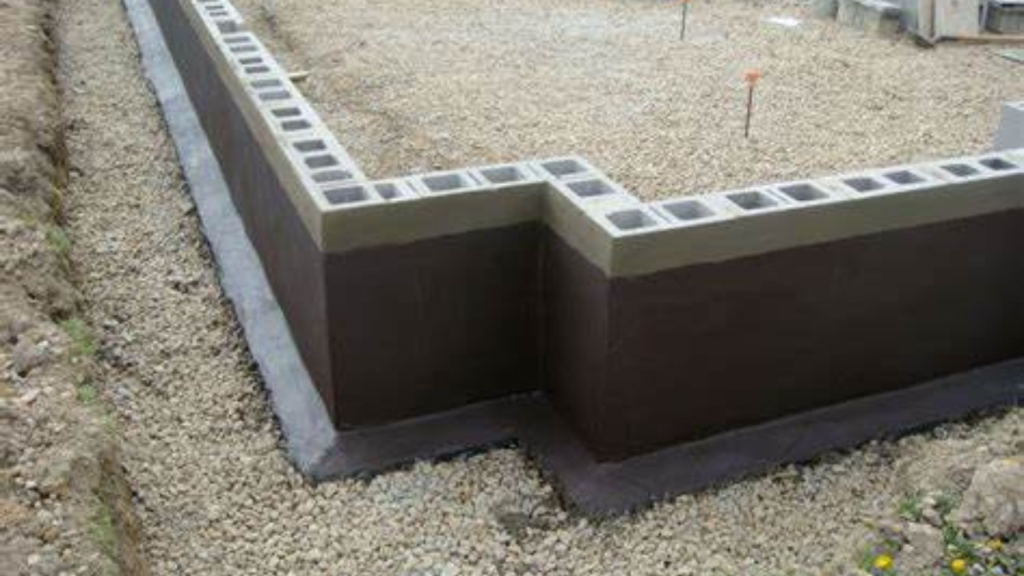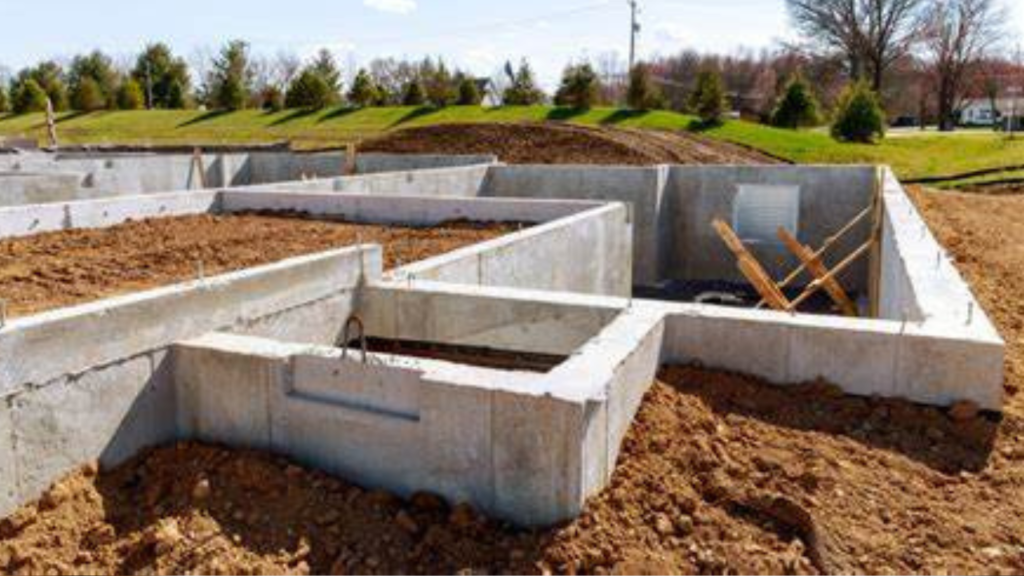When building a house or any structure in Nigeria, one of the key decisions you’ll make is the type of foundation to use and two common options are block foundation and concrete (cast) foundation.
Both serve the same purpose: to support the building and transfer its weight to the ground.
But when it comes to strength, durability, cost, and long-term performance, which one is better?
In this article, Bullionrise consult will break down the differences between block and concrete foundations, their advantages and disadvantages, and help you decide which is best for your project.
Table of Contents
ToggleSee also – Which foundation is suitable for which soil?
What Is a Block Foundation?

A block foundation is built using hollow concrete blocks (6 inches or 9 inches) stacked and bonded together with cement mortar.
This method is commonly used in residential buildings across Nigeria, especially for bungalows and small duplexes.
Advantages of Block Foundation
- Affordable: Cheaper than cast concrete, especially for low-rise buildings.
- Easier to Build: Requires less formwork and labor.
- Good for Dry Areas: Performs well in areas with firm, dry soil.
Disadvantages of Block Foundation
- Less Strong: Hollow blocks have lower load-bearing capacity.
- Weaker Against Water: More vulnerable to moisture or water damage in swampy areas.
- Can Crack Over Time: Especially if the soil shifts or if built poorly.
What Is a Concrete (Cast-In-Place) Foundation?

Concrete foundation is built by pouring mixed concrete (cement, sand, gravel, and water) into a formwork (wood or metal).
It forms a solid wall or base, typically used in raft or pile foundations, and is common in high-rise and commercial structures.
Advantages of Concrete Foundation
- Very Strong and Durable: Ideal for multi-story buildings and heavy loads.
- Water-Resistant: Better performance in waterlogged or swampy areas.
- Fewer Cracks: Solid concrete holds together better under pressure.
Disadvantages of Concrete Foundation
- More Expensive: Costs more due to cement, gravel, and steel reinforcement.
- Requires Skilled Labor: Needs professionals for mixing, formwork, and pouring.
- Takes Time to Cure: Must be left to harden properly before building on it.
See also – pad foundations explained | pros and cons
Block vs Concrete Foundation
- Strength – Block have moderate strength while concrete strength is very high.
- Durability – Block is good if soil is firm while concrete is excellent and suitable for any soil.
- Cost – Block is more affordable while concrete is more expensive.
- Water Resistance – Block has low water resistance while concrete is moderately high.
- Load Capacity – Block is suitable for low-rise buildings while concrete is Ideal for multi-story structures.
- Labor – Block is easier to construct while concrete requires skilled labor.
- Crack Resistance – Block is prone to cracks over time while concrete is less likely to crack.
So, Which Is Better?
Use Block Foundation if:
- You’re building a bungalow or low-rise house
- The soil is firm and dry
- You’re on a tight budget
- You want faster construction
Use Concrete Foundation if:
- You’re building a duplex or multi-story building
- The soil is weak, waterlogged, or swampy
- You want maximum strength and durability
- Your structure will carry heavy loads
Conclusion
There’s no one-size-fits-all answer.
Both block and concrete foundations have their place in Nigerian construction, but your choice should depend on:
- Soil condition
- Building type and load
- Budget
- Longevity goals
If you’re unsure, the best decision is to consult a structural engineer and do a soil test before starting construction.
A strong foundation means a safe, lasting building.
See also – Strip foundation explained to common man
Frequently asked questions
What are the key differences between block foundations and concrete foundations?
Block foundations are constructed using individual concrete blocks, while concrete foundations are made by pouring liquid concrete into a formwork.
Block foundations offer flexibility in shaping and are ideal for lighter structures, while concrete foundations provide higher strength and load-bearing capacity.
Concrete foundations are continuous and monolithic, reducing the risk of structural weak points compared to block foundations.
Which foundation type is more durable and long-lasting?
Concrete foundations are generally more durable as they are seamless and resistant to cracking under heavy loads.
Block foundations, while sturdy, may be susceptible to structural weakness at the joints between blocks.
Concrete foundations offer better resistance to environmental stresses, such as water infiltration and seismic activity, making them suitable for long-term projects.
However, both types can last decades if properly constructed and maintained.
How do block foundations compare to concrete foundations in terms of cost?
Block foundations are typically more cost-effective in terms of material, especially for small-scale or lightweight projects.
Concrete foundations, though more expensive upfront, may save money over time due to their durability and lower maintenance requirements.
Labor costs can also vary, as pouring concrete requires specialized equipment and expertise, while block foundations are less labor-intensive.
Are block foundations easier to construct than concrete foundations?
Yes, block foundations are easier to construct, especially for smaller projects.
They require less equipment and can be built incrementally without the need for large-scale pouring operations.
Concrete foundations, however, require precise planning, formwork, and professional expertise for proper execution.
While block foundations may be quicker for simple structures, concrete foundations provide superior strength for complex designs.










